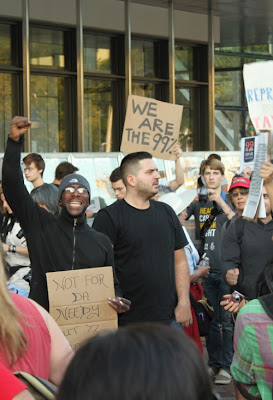I was at an organizing meeting recently
where we were discussing our vision for moving forward a particular
campaign. Our group had already experienced some major success, and
we were considering how we could take these efforts to the next
level, and what our shared objectives might be in the long term. It
had the potential to be a good discussion, to clarify how we wanted
to work together to achieve concrete goals.
Instead, we engaged in a mostly
fruitless debate about macroeconomic principles. We had among us
moderate supporters of the Democrat party, Libertarians, Anarchists,
Socialists and Christians. Each of us had a different take on what an
ideal world would look like. Rather than focusing primarily on the
specific objectives that we as a community could accomplish, we were
sucked into an airy discussion about how to landscape utopia.
For those of us involved in the Occupy
movement, it is easy to get seduced by ideology. We are idealistic
people, and sometimes we simply assume that everyone else in the
movement shares our own particular ideals. But in reality, the Occupy
movement is made up of all sorts of people. We embrace a huge variety
of dreams and visions. This ideological diversity can be frustrating,
and it is easy to fall into an endless debate about what the world
should look like someday. There is a temptation to try to hash out
ideological uniformity before moving forward.
Yet, it is a temptation. If we choose
to go down the road of ideological purity, this whole movement will
stall out. The participants of the Occupy movement come out of a
variety of irreconcilable worldviews, and we are not going to
harmonize these views by talking through them - much less convince
everyone to adopt a party line. If we attempt to do so, the Occupy
movement will disintegrate into theoretical squabbling that distracts
us from the real business at hand - making concrete gains for
ordinary working Americans.
None of this is to say that ideology is
bad. We all need a vision to help keep us on track, and many of us
are part of communities gathered around a specific vision. These
groups can help to empower the whole movement. But the Occupy
movement is not primarily an ideological movement. Certainly, there
are certain broad principles that occupiers everywhere hold to - that
1% of the population should not control most of the wealth and
dominate public discourse, for example - but the Occupy movement does
not represent a monolithic vision for what, exactly, a just and
democratic society should look like. We are part of a broad movement,
encompassing a whole spectrum of ideologies and organizations.
I say all this as someone who has a
definite ideological bent. There are certain ways that I would like
to see our society run, and I hope that the Occupy movement will move
our society closer to that vision. Nevertheless, I recognize that
there are other perspectives within the movement, many of which are
sharply at odds with my own. Despite these differences, we can work
together harmoniously when we focus on concrete actions, rather than
some distant, philosophical endgame. Today, we
are making practical gains for justice. We can continue to do so,
despite our disagreements about what utopia looks like.
As a Christian, my ultimate desire is
to see all people living in the peace and beauty of God's power. I
want to see the fearless love and radical justice of Jesus fill the
world and transform our whole society. Yet, I recognize that this
kind of total transformation comes through small acts of practical
faithfulness - caring
for modern-day orphans and widows, and seeking
liberation for the oppressed. I trust that if I am faithful in
the work that I have been given today, God
will take care of tomorrow. Rather than trying to determine what
the whole structure will ultimately look like, I can be most faithful
- and, ultimately, most effective - by simply picking up the brick
that I have been given and setting it in place.



Amen. It's so hard to see those big picture dreams get in the way of the real work at hand. It is good to have a vision but also good to work together with people different from ourselves and find what unites us.
ReplyDeleteGod bless, Micah. I share so much of what you are so good at articulating. We must put rigid ideology aside and work on small things. And we must see the humanity of people who disagree with us. The lure of rigidity (certainty) is strong on all parts of the political spectrum.
ReplyDelete